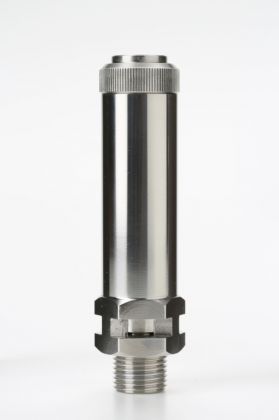
Safety Valve model D14 (PN 40)
DN15 (1/2") - DN20 (3/4") | Orifice 14mm
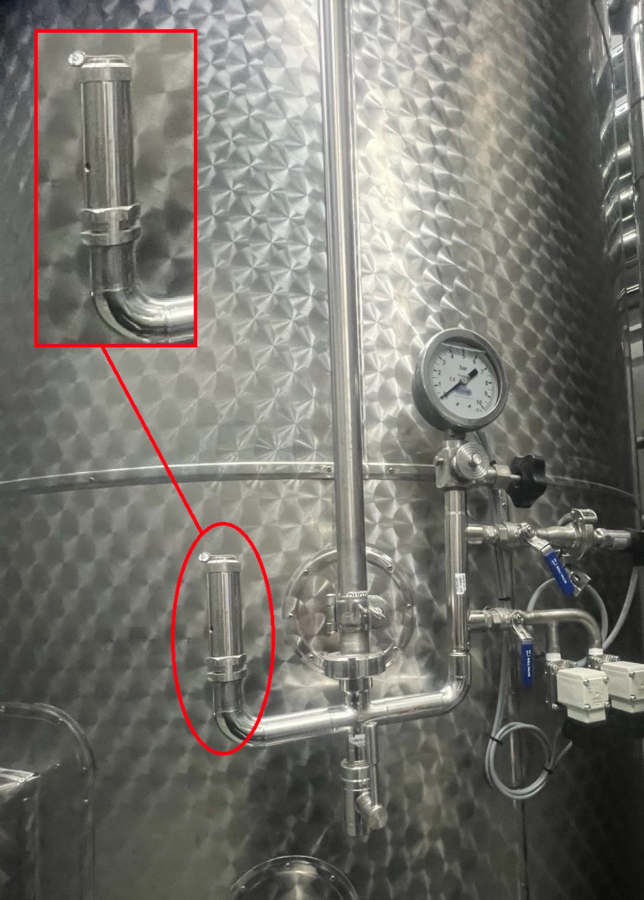
In the wine and brewing industry, managing pressure in fermentation tanks and storage vessels is a critical issue. Safety valves installed on these systems operate under specific conditions, where the operating pressure is very close to the set pressure of the safety valve. This situation is not accidental, but the result of precise production and plant requirements, such as:
In the wine and brewing industry, fermentation and storage systems are designed to operate continuously without significant interruptions. This is because production processes, especially fermentation, require long periods and stable conditions to ensure the quality of the final product. However, the need to keep systems running at all times presents a series of challenges related to both safety management and regulatory obligations set by National Standards for pressure equipment.
In breweries and wineries, safety valves are crucial components for protecting fermentation tanks, which are used in the process of converting wort into beer or grape juice into wine. During fermentation, yeast converts the sugars in the liquid into alcohol and carbon dioxide, a process that generates significant internal pressure within the tanks. If this pressure is not controlled, it can lead to the risk of damaging the vessel, causing product losses, or, in extreme cases, compromising the safety of the system.
Safety valves are therefore installed on the tanks to prevent dangerous overpressure. These valves are designed to automatically open when the internal pressure exceeds a preset value, allowing the controlled release of excess gas, such as CO₂. In many cases, they are mounted on top of the tank, but they can also be placed along gas discharge lines to ensure that every part of the system is protected. The use of these valves is essential to maintain a safe fermentation environment, preventing structural damage to the tanks and ensuring that the fermentation process can occur in a controlled manner, optimizing both the quality of the final product and operational safety.
When the operating pressure is close to the valve's set pressure, even slight variations due to temperature fluctuations, accelerated fermentation, or pressure changes can trigger unwanted discharges. This leads to:
To prevent unwanted safety valve interventions, we set the calibration with a positive margin, adjusting the PSV intervention to +3% of the nominal set pressure. This solution, compliant with ISO 4126, ASME, and PED standards, offers a double advantage:
Frequent opening and closing of the safety valve, even for brief moments, accelerates the wear of seals and contact surfaces. This can compromise the valve's ability to maintain a reliable seal over time, increasing the need for maintenance and the likelihood of malfunctions. If the PSV does not intervene correctly in the event of overpressure, there is a risk of damage to the tanks or even their explosion in extreme conditions.
To ensure reliable long-term operation, we use high-performance soft seals designed to provide an airtight closure even after a valve intervention. This reduces the risk of leaks and keeps the system secure.
The special design of our seals not only optimizes valve sealing but also offers greater resistance to the presence of small particulates or impurities that may be present in the process fluid. As a result, our valves maintain consistent performance, reducing the need for maintenance and ensuring long-lasting protection for the plants.
According to FDA and MOCA regulations (D.E 1935/2004), it is essential that valves are constructed with certified materials that are resistant to corrosion and suitable for food contact, in order to avoid product contamination.
Our valves are made with 100% Italian materials, ensuring full traceability and the highest quality. All components comply with FDA regulations, ensuring safety and reliability in contact with food and beverages.
Upon request, we provide MOCA certification (Materials and Objects in Contact with Food), confirming the suitability of the materials, tested in certified laboratories, for use in winemaking and brewing processes. This guarantees maximum protection against contamination, adhering to the strictest food industry standards.
In breweries and wineries, fermentation tanks and storage vessels are always full or in use, making regular maintenance of safety valves challenging. Disassembly and servicing of a safety valve require plant shutdown, which is often impossible or highly costly due to disruption of the production cycle.
International standards mandates that safety valves be tested and inspected periodically (every 2 or 3 years, depending on the fluid) to ensure their functionality meets safety requirements. However, since these plants operate continuously, scheduling inspections without impacting production is complex. If a safety valve is not regularly certified and tested, the plant could be non-compliant with regulations, risking penalties and, in severe cases, temporary closure. Companies must therefore find solutions that allow compliance without compromising productivity.
To reduce plant downtime and ensure regulatory compliance, we offer a retesting and regeneration service for our safety valves, ensuring they are always certified according to current safety standards.
To maintain operational continuity without interruptions, we support customers with the management of spare valves. This system involves purchasing two identical valves (e.g., valve A and valve B). While valve A remains installed on the system, valve B is sent to us for retesting before the scheduled inspection. This way, at the time of the check, the customer can quickly replace valve A with the newly certified valve B, avoiding machine downtime and ensuring that a new, compliant device is always in operation.
Additionally, our valves can be certified or re-tested, providing all the necessary documentation so that, during the plant inspection, the valve is already tested, certified, and accompanied by the related certificates, simplifying the control process and ensuring maximum safety.
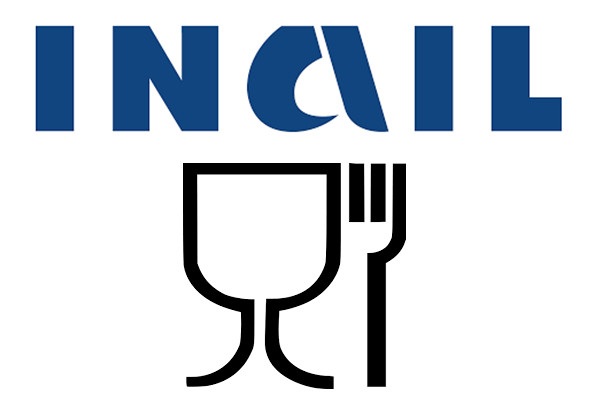
In the wine and brewing industry, INAIL certification is essential in Italy to ensure the safety of pressure systems, ensuring that safety valves comply with current regulations and are tested to prevent operational risks. Periodic inspections allow for the identification of signs of wear, calibration changes, or anomalies that could compromise the proper functioning of the system, reducing the risk of overpressure or uncontrolled leaks. Furthermore, compliance with DM 329/2004 ensures that companies meet safety standards, avoiding penalties or unexpected shutdowns.
At the same time, MOCA certification (D.E. 1935/2004) is crucial to ensure that materials in contact with the product are suitable for food use, preventing contamination that could compromise the quality of wine and beer. Adherence to these standards ensures reliability, safety, and compliance with regulations for businesses in the industry.

DN15 (1/2") - DN20 (3/4") | Orifice 14mm
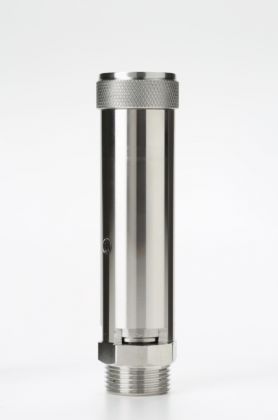
DN20 (3/4") - DN25 (1") | Orifice 20mm
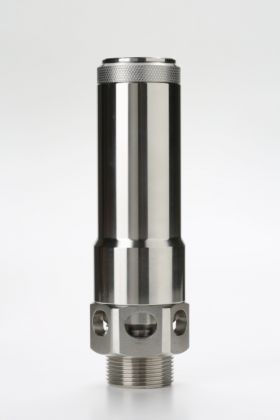
DN32 (1"1/4) - DN40 (1"1/2) | Orifice 25mm
Choosing a Nuova General Instruments safety valve means relying on a product designed and manufactured according to the highest quality and safety standards. In addition to our years of experience and continuous focus on innovation, we offer a range of dedicated services to support our customers at every stage, from product selection to after-sales assistance:
• ⚡ Fast Delivery: Standard production within 10 business days, with a Fast Track option for shipments in just 5 days.
• 📦 Flexible Lot Sizes: We provide both single valves and large batches up to 1000 units, always ensuring top quality.
• 🎨 Customization: Laser marking, colored caps for calibration identification, and removable barcode labels for simplified management.
• ✅ Third-Party Testing: Option to obtain 3.2 test certificates from prestigious organizations such as INAIL, TUV, RINA, LLOYD, DNV, and ABS.
• 📄 Online Certificates: Immediate and unlimited access to technical documentation of the valves through our dedicated portal.
• 🛠️ Product Samples: Ability to test our valves before placing regular orders, with specialized technical support.